A New Dawn for Syria: Trump’s Sanction Lift and Its Implications
May 14, 2025, 3:56 pm

Location: United States, District of Columbia, Washington
Employees: 10001+
Founded date: 1789
Total raised: $6.5M

Location: United States, Massachusetts, Cambridge
Employees: 10001+
Founded date: 1636
Total raised: $303.77K
In a bold move that has sent ripples through the geopolitical landscape, President Donald Trump announced the removal of all U.S. sanctions on Syria. This decision, made during a speech in Riyadh, marks a significant shift in American foreign policy. It’s a gamble, a high-stakes poker game where the stakes are nothing less than the future of a war-torn nation.
For decades, Syria has been shackled by sanctions, labeled a state sponsor of terrorism since 1979. The U.S. government has imposed restrictions that have stifled its economy and hampered humanitarian efforts. The backdrop of this announcement is a country ravaged by civil war, sectarian violence, and the rise of extremist groups like ISIS. Yet, Trump’s rhetoric suggests a new chapter is on the horizon.
The president’s announcement comes on the heels of a dramatic political shift in Syria. The ousting of Bashar al-Assad’s regime in December 2024 has opened the door for a transitional government led by Ahmed al-Sharaa, a figure with a controversial past. Al-Sharaa, a former al-Qaeda member, now claims to be reformed. His leadership is seen as a beacon of hope by some, while others remain skeptical.
Trump’s declaration is not merely a gesture of goodwill. It’s a strategic maneuver, influenced by regional allies, particularly Saudi Arabia. The Crown Prince, Mohammed bin Salman, has been a vocal advocate for Syria’s reintegration into the Arab fold. This lifting of sanctions is framed as a collaborative effort, a joint project between the U.S. and Saudi Arabia aimed at stabilizing the region.
The implications of this decision are profound. By removing sanctions, the U.S. is not just allowing Syria to breathe economically; it’s also signaling a willingness to engage with a country that has been isolated for years. The international community, including the United Nations and various NGOs, has long argued that sanctions hinder humanitarian aid. The devastating earthquake in 2023 highlighted the urgent need for relief efforts, and now, with sanctions lifted, aid organizations may finally have the access they need to provide assistance.
However, this move is not without its critics. Many view it as a reward for a regime that has committed atrocities against its own people. The skepticism surrounding al-Sharaa’s leadership raises questions about the sincerity of this new government. Can a former extremist truly lead a nation toward peace? The road ahead is fraught with uncertainty.
Moreover, the lifting of sanctions could have broader implications for U.S. foreign policy. It raises questions about the consistency of America’s stance on terrorism and human rights. Critics argue that this decision undermines the very principles that have guided U.S. foreign policy for decades. If the U.S. can engage with Syria now, what does that mean for its relationships with other nations labeled as adversaries?
The economic ramifications are also significant. The sanctions imposed on Syria were among the most severe, deterring not just U.S. businesses but also international partners from engaging with the country. With these barriers removed, there’s potential for economic revitalization. Investment could flow into Syria, creating jobs and rebuilding infrastructure. But will foreign investors take the plunge, or will they remain wary of the political instability that has plagued the region for years?
As the dust settles on this announcement, the world watches closely. The lifting of sanctions is a double-edged sword. It offers a glimmer of hope for a nation in ruins, yet it also risks legitimizing a government with a checkered past. The success of this initiative hinges on the ability of the new Syrian leadership to navigate the treacherous waters of governance and reconciliation.
In the coming months, the effectiveness of this policy will be put to the test. Will Syria rise from the ashes, or will it continue to be a battleground for competing interests? The answer lies in the hands of its new leaders and the international community’s willingness to support genuine reform.
In conclusion, Trump’s decision to lift sanctions on Syria is a pivotal moment. It’s a chance for a nation to reclaim its identity and rebuild. But it’s also a reminder of the complexities of international relations. As the world turns its gaze toward Syria, one thing is clear: the journey ahead will be anything but straightforward. The hope for greatness is there, but so are the shadows of the past. Only time will tell if Syria can truly shine.
For decades, Syria has been shackled by sanctions, labeled a state sponsor of terrorism since 1979. The U.S. government has imposed restrictions that have stifled its economy and hampered humanitarian efforts. The backdrop of this announcement is a country ravaged by civil war, sectarian violence, and the rise of extremist groups like ISIS. Yet, Trump’s rhetoric suggests a new chapter is on the horizon.
The president’s announcement comes on the heels of a dramatic political shift in Syria. The ousting of Bashar al-Assad’s regime in December 2024 has opened the door for a transitional government led by Ahmed al-Sharaa, a figure with a controversial past. Al-Sharaa, a former al-Qaeda member, now claims to be reformed. His leadership is seen as a beacon of hope by some, while others remain skeptical.
Trump’s declaration is not merely a gesture of goodwill. It’s a strategic maneuver, influenced by regional allies, particularly Saudi Arabia. The Crown Prince, Mohammed bin Salman, has been a vocal advocate for Syria’s reintegration into the Arab fold. This lifting of sanctions is framed as a collaborative effort, a joint project between the U.S. and Saudi Arabia aimed at stabilizing the region.
The implications of this decision are profound. By removing sanctions, the U.S. is not just allowing Syria to breathe economically; it’s also signaling a willingness to engage with a country that has been isolated for years. The international community, including the United Nations and various NGOs, has long argued that sanctions hinder humanitarian aid. The devastating earthquake in 2023 highlighted the urgent need for relief efforts, and now, with sanctions lifted, aid organizations may finally have the access they need to provide assistance.
However, this move is not without its critics. Many view it as a reward for a regime that has committed atrocities against its own people. The skepticism surrounding al-Sharaa’s leadership raises questions about the sincerity of this new government. Can a former extremist truly lead a nation toward peace? The road ahead is fraught with uncertainty.
Moreover, the lifting of sanctions could have broader implications for U.S. foreign policy. It raises questions about the consistency of America’s stance on terrorism and human rights. Critics argue that this decision undermines the very principles that have guided U.S. foreign policy for decades. If the U.S. can engage with Syria now, what does that mean for its relationships with other nations labeled as adversaries?
The economic ramifications are also significant. The sanctions imposed on Syria were among the most severe, deterring not just U.S. businesses but also international partners from engaging with the country. With these barriers removed, there’s potential for economic revitalization. Investment could flow into Syria, creating jobs and rebuilding infrastructure. But will foreign investors take the plunge, or will they remain wary of the political instability that has plagued the region for years?
As the dust settles on this announcement, the world watches closely. The lifting of sanctions is a double-edged sword. It offers a glimmer of hope for a nation in ruins, yet it also risks legitimizing a government with a checkered past. The success of this initiative hinges on the ability of the new Syrian leadership to navigate the treacherous waters of governance and reconciliation.
In the coming months, the effectiveness of this policy will be put to the test. Will Syria rise from the ashes, or will it continue to be a battleground for competing interests? The answer lies in the hands of its new leaders and the international community’s willingness to support genuine reform.
In conclusion, Trump’s decision to lift sanctions on Syria is a pivotal moment. It’s a chance for a nation to reclaim its identity and rebuild. But it’s also a reminder of the complexities of international relations. As the world turns its gaze toward Syria, one thing is clear: the journey ahead will be anything but straightforward. The hope for greatness is there, but so are the shadows of the past. Only time will tell if Syria can truly shine.